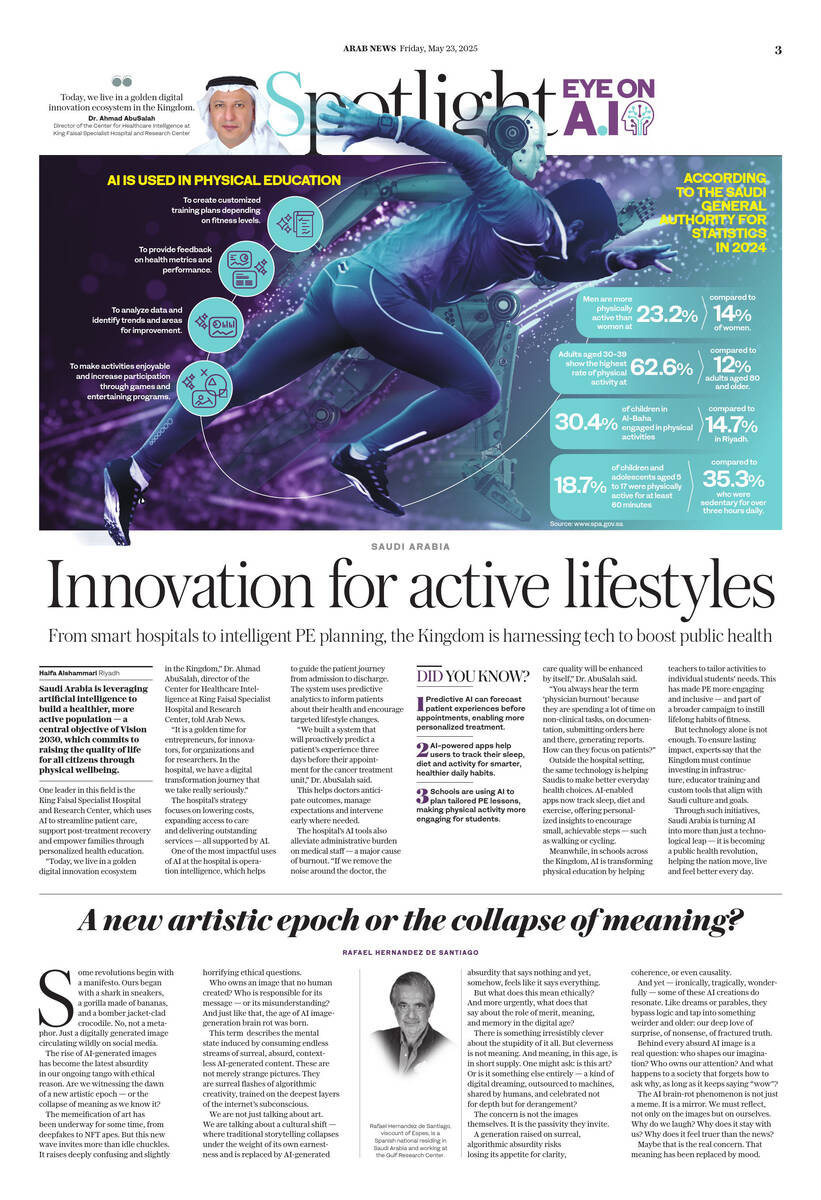How Saudi Arabia is embracing AI to drive healthier lifestyles in line with Vision 2030
RIYADH: Saudi Arabia is leveraging artificial intelligence to build a healthier, more active population — a central objective of Vision 2030, which commits to raising the quality of life for all citizens through physical wellbeing.
AI is playing a pivotal role in this national transformation, with its applications extending across the healthcare sector, educational institutions and even mobile fitness apps that support healthier daily habits.

AI applications now plays a significant role in healthcare, education and even mobile fitness apps that support healthier daily habits. (Getty Images)
One leader in this field is the King Faisal Specialist Hospital and Research Center, which uses AI to streamline patient care, support post-treatment recovery and empower families through personalized health education.
“Today, we live in a golden digital innovation ecosystem in the Kingdom,” Dr. Ahmad AbuSalah, director of the Center for Healthcare Intelligence at King Faisal Specialist Hospital and Research Center, told Arab News.
“It is a golden time for entrepreneurs, for innovators, for organizations and for researchers. In the hospital, we have a digital transformation journey that we take really seriously.”

Early this year, King Faisal Specialist Hospital and Research Centre in Riyadh announced that it has successfully performed a robotic-assisted implantation of an artificial heart pump (HeartMate 3) developed by Abbott. (Photo courtesy of KFSHRC)
Driven by the healthcare transformation program of Vision 2030, the hospital’s strategy focuses on lowering costs, expanding access to care and delivering outstanding services — all supported by AI.
However, Dr. AbuSalah said that adoption of these new technologies must be strategic and sustainable if they are to have the desired effect on patient outcomes and medical practice.
“Some organizations build AI models, keep it for a couple of years, and then shut it down. Why? Because it wasn’t bringing value,” he said.
This section contains relevant reference points, placed in (Opinion field)
One of the most impactful uses of AI at King Faisal Specialist Hospital is operation intelligence, which helps to guide the patient journey from admission to discharge. The system uses predictive analytics to inform patients about their health and encourage targeted lifestyle changes.
“We built a system that will proactively predict a patient’s experience three days before their appointment for the cancer treatment unit,” Dr. AbuSalah said.
This helps doctors anticipate outcomes, manage expectations and intervene early where needed.

Dr. Ahmad AbuSalah, director of the Center for Healthcare Intelligence at King Faisal Specialist Hospital and Research Center in Riyadh. (Supplied)
The hospital’s AI tools also alleviate administrative burden on medical staff — a major cause of burnout. “If we remove the noise around the doctor, the care quality will be enhanced by itself,” Dr. AbuSalah said.
“You always hear the term ‘physician burnout’ because they are spending a lot of time on non-clinical tasks, on documentation, submitting orders here and there, generating reports. How can they focus on patients?”
By automating those tasks, AI frees up time for direct patient care, improving both staff wellbeing and service quality.
Outside the hospital setting, the same technology is helping Saudis to make better everyday health choices. AI-enabled apps now track sleep, diet and exercise, offering personalized insights to encourage small, achievable steps — such as walking or cycling.
In fact, walking and cycling are now the most popular forms of physical activity among Saudi adults, according to a 2024 General Authority for Statistics report.
DID YOU KNOW?
• Predictive AI can forecast patient experiences before appointments, enabling more personalized treatment.
• AI-powered apps help users to track their sleep, diet and activity for smarter, healthier daily habits.
• Schools are using AI to plan tailored PE lessons, making physical activity more engaging for students.
However, the report also noted a gender gap, with 23.2 percent of men being physically active compared to just 14 percent of women.
AI could help to close that gap, offering flexible, accessible ways for women to engage in exercise from home or within their communities.
Meanwhile, in schools across the Kingdom, AI is transforming physical education by helping teachers to tailor activities to individual students’ needs. This has made PE more engaging and inclusive — and part of a broader campaign to instill lifelong habits of fitness.

Last year, the Saudi Ministry of Education added rugby as an elective sport in its physical education curriculum, as part of an effort to promote the importance of having a healthy lifestyle among children. (AFP photo)
In a landmark move last year, the Ministry of Education introduced rugby as an elective sport — an initiative that underscores the growing importance of physical activity in the national curriculum.
But technology alone is not enough. To ensure lasting impact, experts say that the Kingdom must continue investing in infrastructure, educator training and custom tools that align with Saudi culture and goals.
Through such initiatives, Saudi Arabia is turning AI into more than just a technological leap — it is becoming a public health revolution, helping the nation move, live and feel better every day.



AloJapan.com